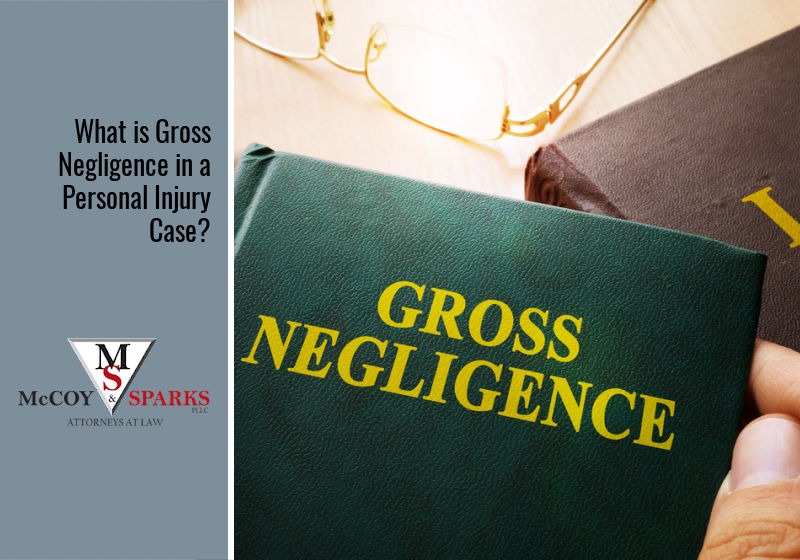
Personal injury cases usually involve negligence, meaning that someone failed to act reasonably in a given situation. Gross negligence is more serious than standard negligence and means that someone demonstrated extreme carelessness or disregard for others’ safety, resulting in an injury.
In order to recover certain damages, an injured party needs to prove that the defendant demonstrated gross negligence.
Claiming Gross Negligence in Kentucky
Standard negligence involves a person failing to perform reasonable care in a given situation, resulting in someone being injured. For example, someone may breach the standard of care by failing to observe the speed limit, which then results in a car accident and injury. Standard negligence typically involves someone making a mistake.
Gross negligence is far more extreme and involves more than a simple mistake. Some examples of gross negligence include:
- Driving while seriously impaired by drugs or alcohol
- A doctor prescribes a drug without checking a patient’s other prescriptions or allergies, resulting in serious adverse effects
- A property owner consciously leaves a hazard in a walkway or another area with foot traffic, leading to an injury
- Driving recklessly in an area with many pedestrians
Kentucky’s Supreme Court defines Gross Negligence as:
“’Gross negligence’ is defined as being something more than the failure to exercise slight care. There must be an element either of malice or willfulness or such an utter and wanton disregard of the rights of others as from which it may be assumed the act was malicious or willful. Another definition states gross negligence is a failure to exercise reasonable care, and then an additional finding that this negligence was accompanied by wanton or reckless disregard for the lives, safety or property of others.” Phelps v. Louisville Water Co., 103 S.W.3d 46, 49 (Ky. 2003)
Someone engaging in gross negligence sometimesexhibits a pattern of disregard for others. For example, if a doctor frequently misprescribes medications, it no longer becomes a simple mistake but a pattern of gross negligence that can lead to someone’s death.
Proving Gross Negligence in a Personal Injury Claim
When filing a personal injury claim, you need to be able to prove certain factors relating to your injury. You need to prove that:
- The defendant owed you a duty of care: For example, a driver on the road owes you the duty to drive responsibly and not wreck into you.
- The defendant failed in their duty of care through negligent behavior: For example, if a driver wrecks into you because they were distracted, they engaged in negligent behavior which resulted in the accident.
- You experienced an injury as a result of the defendant’s negligence: For example, the car accident caused by the negligent person directly resulted in your injury.
- You wouldn’t have been injured if it weren’t for the defendant’s negligence: If the defendant hadn’t acted negligently and broken reasonable care, you wouldn’t have experienced an injury. For example, if the driver hadn’t struck your vehicle, you wouldn’t have become injured.
In cases of gross negligence, you need to go beyond proving that the defendant failed to act reasonably. You need to prove that the defendant’s actions ignored others’ rights to safety. The defendant needs to have known that their negligence could severely injure or kill someone.
Punitive Damages in Kentucky
Why is proving gross negligence important? Because proving that another person engaged in gross negligence may allow you to recover punitive damages. Punitive damages are different from other forms of damages, like medical bills and lost wages. Punitive damages are designed to punish the defendant rather than compensate the victim. A court may award the victim punitive damages to dissuade the defendant from engaging in grossly negligent actions in the future.
For example, a company that was incredibly reckless and caused others harm may have to pay punitive damages to injured victims. A court may award these damages to prevent the company from engaging in similar activities in the future, and the damages are also meant to dissuade other companies from engaging in similar behaviors.
Punitive damages are rare, so you need to be able to prove that the defendant’s actions were especially disgraceful.
Contact a Central Kentucky Personal Injury Attorney
Proving gross negligence is far more challenging than standard negligence. You need to go beyond proving that the defendant broke reasonable care and provide evidence that they engaged in an especially objectionable behavior that overtly disregarded the safety of others.
If you’re considering filing a personal injury claim that involves gross negligence, you need a qualified personal injury attorney to help you prove your case. A skilled attorney will help you prove gross negligence by gathering witness testimonies, bringing in medical experts, and providing accident reconstruction experts who can corroborate the defendant’s gross negligence.
In the event that you experience an injury in Central Kentucky, contact McCoy & Sparks Attorneys at Law. We’ve helped many Kentucky residents receive the damages they deserved for gross negligence including medical bills, lost wages, pain and suffering, loss of future earnings, loss of consortium, and more. Call us today at 844-459-9467, or click here to schedule a free case consultation.

